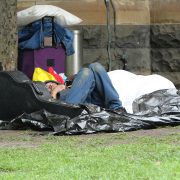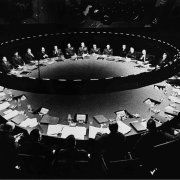Push them out … or work it out?
As a community and society, our civility is always tested if someone offends our norms of behaviour and presents a threat.
It should go without saying that the tools of good consultation are capable of actually alleviating any threat, changing offending behaviour and retaining our civility, all while achieving mutual gains.
Oddly, more often than not, this is not the solution we reach for.
Take for example the way some of Melbourne’s media recently pandered to prejudices by screaming outrage at street beggars after one “crazed” person was pictured aggressively harassed pedestrians.
Clearly, something should be done. But what response was offered?
To protect our centrally-heated, off-the-streets lifestyle in this most liveable city, the suggested solution was to get tough and eject these “professionals” from plying a street trade.
Sure, homeless people sleeping rough outside your store is a real problem that traders don’t deserve; and no-one deserves being accosted on our liveable streets.
But are we seriously to believe – as Melbourne’s famous winter winds bite – that it is a choice to sleep rough and beg “professionally”.
While it may satisfy some stereotypical views, asking police to “get tough” is most likely to displace, suppress and aggravate the problem for another day.
Instead, the tools of engagement and consultation would allow us to approach the issue as a shared problem that may be resolved by a shared solution.
Skilled, facilitated community negotiation is far more likely to achieve a lasting solution for all. It would seek a solution by bringing key parties around a table. This would include police, and State Government, Councils, Community/Welfare services and mental health services.
This is harder work than just “getting tough”. But we have the skills to do this and it’s the kind of work that would achieve resolutions that afford us our desired civility, and our liveability.



